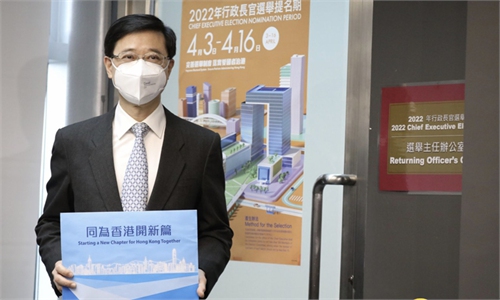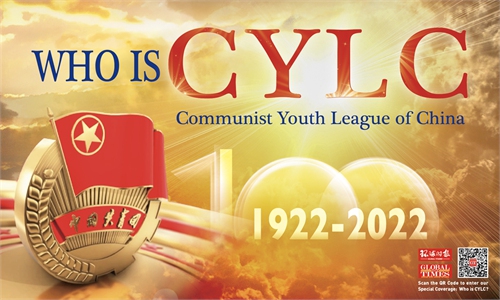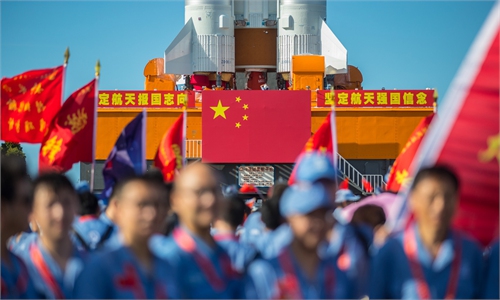
Chinese youth File Photo: CFP
Editor's Note:
May 4 marks the Youth Day in China. Year 2022 also marks the 100th anniversary of the founding of the Communist Youth League of China (CYLC). This generation of Chinese youth not only have more opportunities than their predecessors, but have interacted more with their peers elsewhere across the world. For this reason, their confidence and faith will have a profound influence around the world. The Global Times has invited several international observers to comment on their impression of this generation of Chinese youth. This is the first in the series.
China observes Youth Day on May 4 every year to celebrate the country's young people. Like anywhere across the world, these citizens are the future of their society. Their attitudes and outlooks will shape the coming decades. Eventually some of the youth from today will lead the Communist Party of China (CPC). Considering China's growing role in the world, it's important to analyze the contemporary situation of its youth, and May 4 is the best occasion to do so.
This generation of Chinese youth has more opportunities than their predecessors. They are coming of age as their proud civilization-state has undoubtedly risen from its knees under the leadership of the CPC with Chinese President Xi Jinping at its core. The past generations built the basis upon which the current one will succeed. The Belt & Road Initiative (BRI) is transforming globalization by making it more equitable and just. It's also creating unprecedented opportunities for Chinese youth.
The People's Republic of China has never been more open to the rest of the world than it is today. Chinese youth are very well informed about international events and many have interacted with their peers elsewhere across the world. Some of them have done this through studying, traveling, or working abroad, and others through meeting foreigners who've studied, traveled, or worked in China. These experiences have made them appreciate how impressively their country has developed in recent years.
The China of 2022 is very different from the China of 2012, which itself was fundamentally different from the one a decade prior and so on and so forth. This explains why they're so patriotic. Not only that, but foreign meddling in their society is fresh in their minds. They'll never forget how the US and the West tried to destabilize their society through its illegal activities in Hong Kong, Taiwan, Xizang, and Xinjiang.
To be clear, their patriotism isn't nationalism since there's a difference between these similar concepts that are sometimes confused with one another and used synonymously. Patriotism is love for one's homeland without expressing sentiments that occur at the expense of others while nationalism most often includes some hostile reaction to foreign societies. Chinese youth respect all others equally, but they won't tolerate other countries trying to destabilize their own.
China's national model of democracy is unique because it's the result of their civilization's culture, historical experiences, and traditions. It works well for the People's Republic and they're fiercely proud of it because of how effectively it's helped develop and stabilize their society, but they don't aspire to export it to others. This makes them very different from some of their Western counterparts who regard their own such models as universal and therefore seek to aggressively impose them onto others.
This observation leads one to the conclusion that there are ideological differences at play that explain these opposite stances between Chinese and Western youth. The first-mentioned are influenced by multipolarity while the second are under the sway of unipolarity. Chinese youth are politically conscious of the irreversible political processes that are transforming international relations amidst the ongoing global systemic transition towards multipolarity while Western youth are mostly ignorant of them.
The heightened consciousness of Chinese youth is the direct result of the CPC's proactive educational efforts to inform the next generation of the objectively existing state of affairs across the world. This is in contrast to the approach employed by many Western governments, which is to indoctrinate their people into clinging to the discredited unipolar model of international relations that's quickly entering the dustbin of history.
These ideological differences also shape each youth's attitudes. Chinese are much more peaceful and respectful of others, preferring diplomacy and political solutions to aggression and conflict, while Westerners are predisposed to supporting their governments' destabilizing activities abroad. Each society is developing along completely different trajectories for these reasons, which is in turn influencing the future course of their respective country's role in the world.
Contemporary Chinese youth have more responsibilities than their predecessors because of the growing global role of their civilization-state. They're entrusted by the rest of the world with continuing China's peaceful rise and consequently revolutionizing international relations so that it becomes more equitable and just upon the completion of the ongoing global systemic transition to multipolarity. With these promising youth poised for future leadership positions, the future of humanity is in good hands.
The author is a Moscow-based US political analyst. opinion@globaltimes.com.cn



